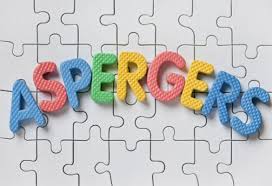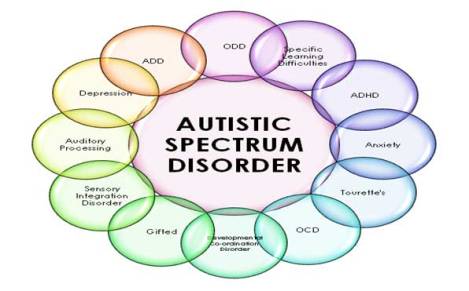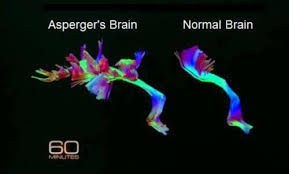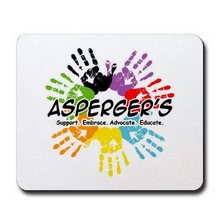Tags
Anxiety, Asperger Syndrome, Autism, Autism Spectrum, Autistic Tendencies, Awkward Body Postures, Clumsiness, Depression, Ego centric, High Functioning, High Intelligence, Low Self-Esteem, OCD, Odd, Pervasive Developmental Disorder, Poor Social Skills, Superior Memory, Unusual Interests

All kids go through awkward stages and phases in life, and oftentimes can struggle in social situations. But what if you notice this happening beyond just a phase? By answering a few questions below it may show that there may be more going on with your child.
- Does your child interact poorly in social situations?
- Does your child obsess a lot?
- Does your child have odd speech patterns?
- Does your child have peculiar mannerisms?
If you answered “yes” to any of the above, your child may have Asperger Syndrome.
What Is Asperger Syndrome?

Asperger Syndrome is named after Hans Asperger, a Viennese pediatrician, who in 1944 first described a set of behavior patterns that he saw in his patients, who were mostly males. Asperger noticed that although these boys had normal intelligence and language development, they had severely impaired social skills, were unable to communicate effectively with others, and had poor coordination.
Asperger Syndrome (AS) is a neurobiological condition. People who have AS are born with it and have it for life. As they mature, they may gain new skills, outgrow some of their AS traits, and use their strengths to compensate for their areas of disability. AS is generally considered a form of autism and is part of a group of conditions called “autism spectrum disorders (ASD)”. The term “autism spectrum” refers to a range of developmental disabilities and symptoms can appear in different combinations and in varying degrees of severity. Terms that describe children who fall within the spectrum are “low-functioning”, “high-functioning”, “autistic tendencies”, and “pervasive developmental disorder”. Kids who have AS share many of the same symptoms as kids who have high-functioning autism.
Boys are three to four times more likely than girls to be affected by AS. According to the Asperger Syndrome Coalition of the United States, many kids are diagnosed after age 3, with most kids being diagnosed between the ages of 5 and 9.
What Causes It?

Researchers and mental health experts are still investigating the causes. Some research points to the possibility of brain abnormalities. Structural and functional differences in specific areas of the brain have been seen in people who have AS.
Other research indicates that there is a genetic foundation for AS, involving a number of different genes. In families where a child has AS, one or both biological parents will also have AS, or have AS traits to some degree. Other relatives in the family might have AS or AS traits as well. People with AS have reported that their relatives from previous generations were eccentric or quirky, were diagnosed with a mental illness or hospitalized, lived a reclusive life, were chronically unemployed, or married and divorced multiple times. They also said that they were extremely intelligent, had superior memory, had single-minded focus, were original thinkers, and had unusual interests. Many of these same relatives were very successful in the areas of engineering, math, writing, composing, philosophy, and other fields. These relatives, whether quirky, gifted, or both, most likely had AS and were undiagnosed. There seems to be a hereditary component to AS and research indicates that in some cases AS may be associated with other mental health disorders such as depression and bipolar disorder.
Asperger Syndrome is NOT caused by how a person is brought up, so parents should not blame themselves.
Is There A Cure?
Currently, there is no cure for Asperger Syndrome. Kids who are born with Asperger Syndrome have it for life. Many people who have AS lead full and happy lives, and the likelihood of them achieving this, is helped through appropriate education, support, and resources.
Symptoms and Behaviors Typical of Asperger Syndrome:
- Speech is typically scripted, robotic, repetitive, jerky, or unusually fast.
- Has difficulty knowing what to say or how to behave in social situations, with the tendency to say the “wrong thing”. May appear awkward or rude. Conversations tend to be one sided, long winded, without noticing if the person they are talking to is listening. Doesn’t understand the give and take of “small talk”. This is from having a language disorder where they speak literally and don’t know how to use language in a social context. Shows little eye contact and few facial expressions.
- Trouble perceiving the intentions and emotions of other people, because they ignore or misinterpret cues such as facial expressions, body language, humor, sarcasm, and vocal intonation and unintentionally upset people due to appearing insensitive to others’ feelings.
- Highly intelligent.
- Appears ego centric or self absorbed, odd or eccentric.
- Has difficulty making friends of the same age. Relates better to adults or younger children.
- Displays awkward body postures and gestures (may do hand or finger flapping), is clumsy and uncoordinated.
- Inflexible and resistance to change. Small changes and transitions are upsetting. Familiar objects, settings, rituals, and routines are preferred.
- Focuses on a few interests that are time consuming and which cause isolation.
- Difficulty with “executive functioning”, which is organizing, initiating, analyzing, prioritizing, and completing tasks.
- Extremely sensitive to light, sounds, smells, tastes, and textures. Many people with AS outgrow these sensory issues to some extent as they mature.
- Focuses on the details and misses the big picture.
- Feels different, disconnected, and like they don’t “fit in”.
- Is vulnerable to stress and this can lead to problems such as low self-esteem, depression, anxiety, and obsessive-compulsive behaviors.
- Lack of common sense.
- Memorizes information easily, has good grammatical skills and an advanced vocabulary, however struggles with reading, math, and writing.
- May engage in violent outbursts, self-injurious behaviors, tantrums or meltdowns.
- Has limited attention span, daydreams when over stimulated.
If You Suspect Your Child Has Asperger Syndrome
If your child shows some of the symptoms and behaviors typical of AS, it’s critical to seek help from your doctor. The sooner the child gets treatment, the better their future will be. Early intervention that includes educational and social training, while a child’s brain is still developing, is very important. Your doctor can refer you to a mental health professional or specialist for further evaluation.
Asperger Syndrome can be very difficult to diagnose. It’s not uncommon for a child to be diagnosed with attention deficit hyperactivity disorder (ADHD) before a diagnosis of AS is made later. Children with AS function well in most aspects of life, so it can be easy to attribute their strange behaviors to just being “different”.
If you need to take your child to be evaluated, what should you expect?
When you take your child to a specialist to be evaluated, they will complete a psychosocial evaluation. The specialist will ask you when your child’s symptoms started, when their motor skills and language patterns developed, and gather information about your child’s personality and behavior (interests and unusual habits), social interactions, and how well they make friends. In addition, the specialist will complete a psychological evaluation and gather information about your child’s communication skills to determine their strengths and areas of deficiencies.
Treatment for Asperger Syndrome
There isn’t a single type of treatment that is used for everyone. Behaviors and problems vary from child to child. Depending on what their strengths and deficiencies are, kids may benefit from these types of treatments:
- Parent education and training.
- Specialized educational interventions.
- Social skills training.
- Language therapy.
- Sensory integration training for younger kids (performed by an occupational therapist where the child is desensitized to stimuli to which they are overly sensitive).
- Psychotherapy or behavioral/cognitive therapy for older kids.
- Medication.
How To Help Your Child In General:

- Your child will act differently than other children so the first thing to do is to look into educational or training programs for parents in order to learn how to help them. You are their first teacher and are key to their success.
- Don’t be ashamed of your child’s disability. Speaking openly about it may help in finding others who are going through the same thing as you and who can be supportive to you.
- Determine what a tolerable social and physical environment is for your child and provide it.
- Establish a clear, consistent daily routine, with expectations of behavior and consequences that can be followed at home and at school. This will help reduce your child’s negative behaviors and a daily routine will create stability and comfort for them. It will also reduce demanding behaviors. For example, by establishing a set time to give them attention, they are less likely to show aggression in order to get your attention.
- If you need to make any changes or transitions, give your child plenty of warning ahead of time.
- Try some behavior modification. You must determine what need the “bad” behavior is fulfilling and then teach your child a replacement behavior that will satisfy the need.
- Teach your child self-help skills. Teach them to know what they need and the language to ask for it. This will help them achieve independence.
- Talk less, slower, calmer and in a clear language that the child can understand.
- Use kindness and humor for mistakes and enjoy your child’s strengths.
- Teach new concepts by using your child’s interests.
- Use visuals to teach your child a problem solving method for when they are stuck.
- Stress management techniques may be helpful to control anxiety in older kids with AS.
- As children develop and advance in their relationships with others, your child may struggle to keep up at the same pace and may not be able to stay in friendship groups. They may only be able to participate in special interest groups (i.e. science club).
- Find a support group so that you get help for yourself and other family members. You can’t help your child if you are not meeting your own emotional and physical needs. Your community may offer support groups at a local hospital or at a mental health center.
- Remember that your child is part of a family unit and that their needs should be balanced with those of other family members.
How To Help Your Child At School:
- Find a program that addresses your child’s specific needs, addresses areas where they are “deficient”, focuses on long-term outcomes, and takes their developmental level into consideration.
- Once your child is enrolled in school, speak to the school about their special needs.
- Work with educators on the best way to teach your child and how to make changes to the classroom to help their learning experience. Teachers will want to know about how you manage your child’s behavior, any special routines you’ve established, any interests your child has, and how your child communicates.
- Inform the school if your child is sensitive to certain sounds, smells, or being touched.
- Fatigue after school is often a problem for kids with AS and facing homework at the end of the day can be very stressful. You may need to compromise with the school about the learning objectives of homework and what your child actually needs to do. Since many kids with AS can focus well in some classes (those built on facts), they may not need the repetitive learning tasks that other children need.
- Be aware that secondary school can be very stressful for children with AS because of the daily challenges of having several different teachers, having to move between classrooms, and having different time tables each day. These changes can cause considerable confusion for someone who is very resistant to change.
Adults In The Workplace

A society designed for and dominated by the neurotypical majority (people who do not have AS) can feel unwelcoming and overwhelming to someone who has AS. For example, our society places expectations on children at a very young age to “play well with others” and grow up fast. Society expects adults to work 40-60 hour work weeks under fluorescent lights, attend meetings, work on teams, rapidly absorb oceans of information, and multi-task. This can pose many problems for a person who has AS.
The good news is that many adults who have AS go on to become successful professors, lawyers, physicians, artists, authors, and educators. People who have AS have a lot of skills that can help them function well in the workplace. For example, a person with AS often notices visual details and can remember facts well. These skills are useful for many professions. The downside is that a person with AS can become too perfectionistic, too obsessed with details, or has trouble seeing the big picture and can’t complete a project. Other skills that a person with AS can utilize to their benefit in the workplace are:
- Normal to very high intelligence.
- Good verbal skills, including rich vocabularies.
- Originality and creativity, including a propensity for “thinking outside the box”.
- Honesty and ingenuity.
- Strong work ethic, with particular attention to accuracy and quality of work.
- Special interests that can be tailored toward productive work. Individuals who have intensive knowledge in one or more specific areas can channel their expertise toward new discoveries and creations in their chosen field.
- Keen senses that allow them to see, hear, or feel subtle changes in the environment that others do not, resulting in phenomenal powers of observation.
With this being said, there is strong evidence that many superstars such as Vincent Van Gogh, Emily Dickinson, Albert Einstein, code breaker Alan Turing, and musician Glen Gould all had Asperger Syndrome and your child could be the next superstar!
Many people with AS can function well in most aspects of life, so the condition does not have to prevent your child from succeeding academically or socially. If you have a child who has Asperger Syndrome and you want to find out how you can help them, we are here for you. Call (810) 299-1472 today to set up an appointment.
References:
AANE. What is Asperger Syndrome? Retrieved 2016, from http://www.aane.org: http://www.aane.org/about_asperger_syndrome/what_is_asperger_syndrome.html
AANE. Asperger Syndrome Interventions for Children. Retrieved 2016, from http://www.aane.org: https://www.aane.org/about_asperger_syndrome/asperger_syndrome_interventions_children.htm
Hutton, Mark. How Parents Can Help Their Aspergers Child: 30 Tips and Strategies. Retrieved 2016, from www.myaspergerschild.com: http://www.myaspergerschild.com/2010/12/how-parents-can-help-their-aspergers.html
Brain Balance Achievement Centers. Signs and Symptoms of Asperger Syndrome. Retrieved 2016, from http://www.brainbalancecenters.com: http://www.brainbalancecenters.com/blog/2012/02/signs-and-symptoms-of-asperger-syndrome/
KidsHealth.org. Asperger Syndrome. Retrieved 2016, from kidshealth.org: http://kidshealth.org/parent/medical/brain/asperger.html#
